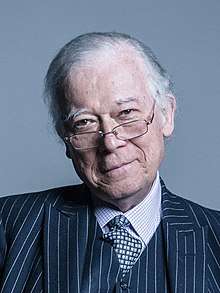Dale Campbell-Savours
Dale Norman Campbell-Savours, Baron Campbell-Savours (born 23 August 1943) is a British Labour Party politician. The Member of Parliament (MP) for Workington from 1979 to 2001, he now sits in the House of Lords.
The Lord Campbell-Savours | |
|---|---|
 | |
| Member of Parliament for Workington | |
| In office 3 May 1979 – 14 May 2001 | |
| Preceded by | Richard Page |
| Succeeded by | Tony Cunningham |
| Personal details | |
| Born | 23 August 1943 |
| Nationality | British |
| Political party | Labour |
| Spouse(s) | Gudrun Kristin Runolfsdottir |
Early life
He was educated at Keswick School and at The Sorbonne, Paris, and became Managing Director of a clock and metal component manufacturing company. He married Gudrun Kristin Runolfsdottir in 1970, and they had three sons.
Parliamentary career
A councillor on Ramsbottom Urban District Council from 1972–1974, he contested Darwen at both the February 1974 and October 1974 general elections and then Workington at a by-election in 1976. He was elected Member of Parliament for Workington at the 1979 general election. He represented Workington until his retirement from the House of Commons in 2001.
Campbell-Savours was opposition spokesman for international development (1991–1992) and for food, agriculture and rural affairs (1992–1994), but then resigned from the front bench due to ill health. He was a member of various select committees, including: agriculture (1994–1996); standards and privileges (1995–2001); and the Intelligence and Security Committee (1995–2001).
House of Lords
He was created a life peer as Baron Campbell-Savours, of Allerdale in the County of Cumbria on 4 July 2001[1] and now sits in the House of Lords.
His political interests are listed as social work, education and health reform, and industrial democracy. He is Patron of the Cumbria Deaf Association, The Rural Academy Cumbria, and is President of both Allerdale Mind, and the Cumberland County League. He enjoys trout fishing and music in his spare time.
Campbell-Savours is a strong advocate for reform of rape laws to prevent innocent men being victims of false allegations. Most notably he used his Parliamentary privilege to reveal the identity of a serial false accuser, who had previously remained anonymous due to laws which protect women who report sexual assault. His actions were praised by some legal practitioners and the Daily Mail,[2] who also published the woman's name, and led to a reconsideration of the anonymity laws by the Government. However, the move was described as "outrageous" by women's rights campaigners,[3] who claimed that the decision to name the woman was illegal, an attack on anonymity laws and amounted to persecution of women who report rape.[4] The named woman, who was never convicted of perverting the course of justice, said that Campbell-Savours decision was a "setback for all victims of sexual assault".[5]
References
- "No. 56268". The London Gazette. 9 July 2001. p. 8071.
- "Sex attack liar named by Peer". Mail Online. Retrieved 10 January 2014.
- "False rape accusers may lose right to anonymity". The Independent. Retrieved 10 January 2014.
- "Ending the attack on rape survivors who report to the police". Against Rape. Retrieved 23 June 2014.
- "'Rape victim' rounds on peer who named her as liar". The Guardian. Retrieved 10 January 2014.
External links
- Hansard 1803–2005: contributions in Parliament by Dale Campbell-Savours
- Portraits of Dale Campbell-Savours at the National Portrait Gallery, London

- Announcement of his introduction at the House of Lords House of Lords minutes of proceedings, 19 July 2001
| Parliament of the United Kingdom | ||
|---|---|---|
| Preceded by Richard Page |
Member of Parliament for Workington 1979–2001 |
Succeeded by Tony Cunningham |
| Orders of precedence in the United Kingdom | ||
| Preceded by The Lord Pendry |
Gentlemen Baron Campbell-Savours |
Followed by The Lord MacGregor of Pulham Market |